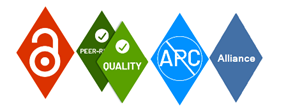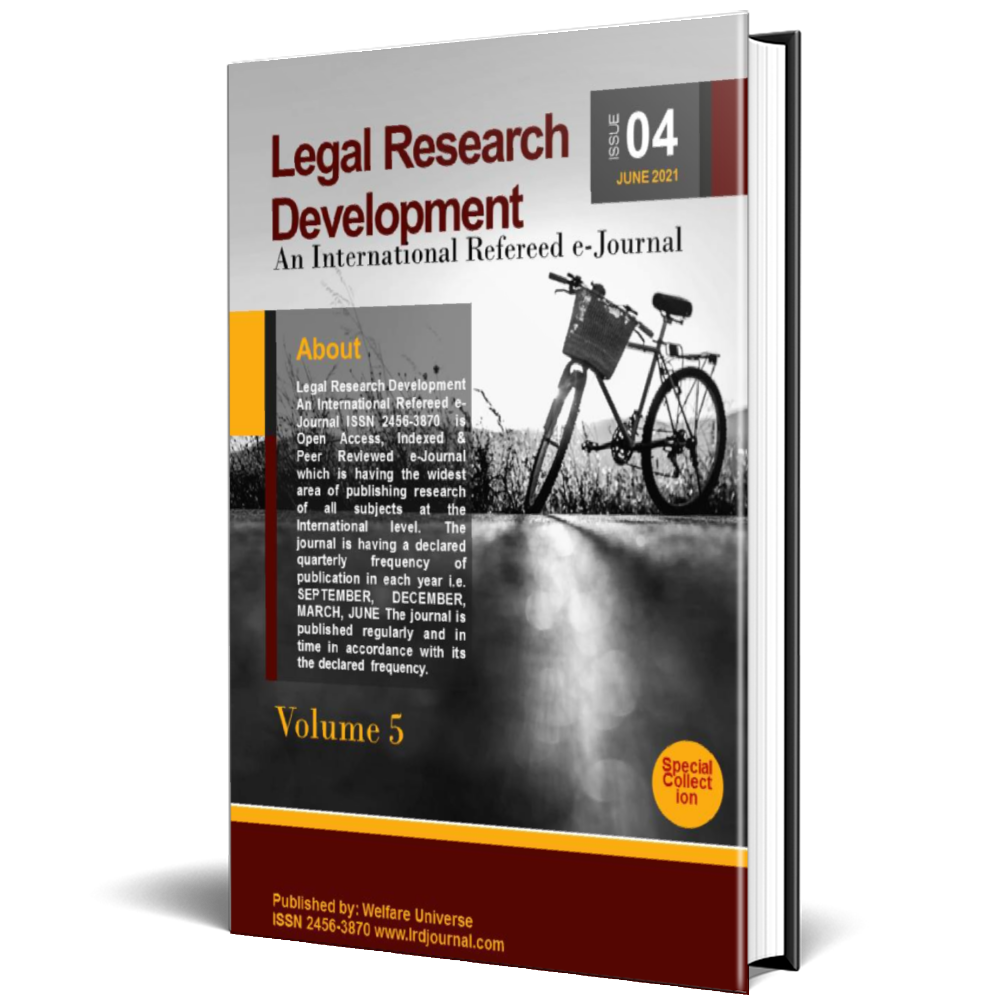Reforming Plastic Waste Management: A Legal Perspective on Extended Producer Responsibility and Circular Economy Policies
DOI:
https://doi.org/10.53724/lrd/v9n3.3Keywords:
Plastic Waste, Circular Economy, SDGs, Basel Convention, Extended Producer, ResponsibilityAbstract
Environment is what we all have and is what we all need to protect and preserve. The exponential growth of plastic waste is becoming a pressing environmental concern, necessitating a paradigm shift in waste management strategies. The usability and ready availability of plastic makes it impossible to eliminate it from our lifestyle but at the same time the problem of the waste accumulated over the years is of a growing concern. This paper examines the role of Extended Producer Responsibility (EPR) and Circular Economy (CE) policies in reforming plastic waste management from a legal perspective. Extended Producer Responsibility is a cornerstone of circular economic policies, it assigns manufacturers responsibility for the waste generated by their products. This approach has been increasingly adopted globally, with varying degrees of success. This paper analyzes the legal frameworks governing EPR, highlighting best practices and challenges. A critical examination of Circular economic policies reveals that they often lack a robust legal foundation, hindering effective implementation. A harmonized legal framework is essential for the success of plastic waste management system in an economy. The paper concludes on a note that legally robust policy framework is the need of the hour. It emphasizes the need for policymakers to adopt a holistic approach, incorporating product design, waste management, and education, to address the plastic waste crisis efficiently and effectively.
References
Jambeck, J. R., et al. (2015). "Plastic Waste Inputs from Land into the Ocean." Science, 347(6223), 768–771
Lederer, J. (2019). Global Plastic Waste: Legal Mechanisms to Reduce Environmental Impact. Oxford University Press
Lederer, J. (2019). Global Plastic Waste: Legal Mechanisms to Reduce Environmental Impact. Oxford University Press
Basel Convention (2019). Technical Guidelines on Plastic Waste. Basel Convention Secretariat
Hopewell, J., et al. (2009). "Plastic recycling: challenges and opportunities." Philosophical Transactions of the Royal Society B: Biological Sciences, 364(1526), 2115-2126.
Jambeck, J. R., et al. (2015). "Plastic Waste Inputs from Land into the Ocean." Science, 347(6223), 768–771.
Tuncer, B., et al. (2020). "Extended Producer Responsibility: Current Policy Mechanisms and Implementation Challenges." Waste Management and Research, 38(10), 907-915.
Srinivasan, A., et al. (2020). "Plastic Waste Management in India: An Analysis of Policy Framework and Implementation Challenges." Indian Journal of Environmental Protection, 40(7), 641-652.
Supra 8
Ellen MacArthur Foundation (2013). Towards the Circular Economy: Economic and business rationale for an accelerated transition. Ellen MacArthur Foundation
Kirchherr, J., et al. (2018). "Barriers to the Circular Economy: Evidence from the European Union." Ecological Economics, 150, 264-272.
Bocken, N. M. P., et al. (2016). "Product design and business model strategies for a circular economy." Journal of Industrial Production Engineering, 33(5), 308-320.
European Commission (2018). The Plastic Waste Problem: A European Solution. European Commission.
European Commission (2020). Circular Economy Action Plan: For a Cleaner and More Competitive Europe. European Commission.
Srinivasan, A., et al. (2020). "Plastic Waste Management in India: An Analysis of Policy Framework and Implementation Challenges." Indian Journal of Environmental Protection, 40(7).
Lederer, J. (2019). Global Plastic Waste: Legal Mechanisms to Reduce Environmental Impact. Oxford University Press
Supra 16
Supra 1
European Commission (2018). The Plastic Waste Problem: A European Solution.
ibid
Kreiger, S., & Smink, M. (2014). "The Green Dot System: A Case Study in the Role of Extended Producer Responsibility in Packaging Waste Management." Journal of Environmental Policy & Planning, 16(3), 285-301.
Korhonen, J., et al. (2018). "Circular Economy as an essentially contested concept." Ecological Economics, 143, 37-46.
Kirchherr, J., et al. (2018). "Barriers to the Circular Economy: Evidence from the European Union." Ecological Economics, 150.
Hopewell, J., et al. (2009). "Plastic recycling: challenges and opportunities." Philosophical Transactions of the Royal Society B: Biological Sciences, 364(1526), 2115-2126.
Bocken, N. M. P., et al. (2016). "Product design and business model strategies for a circular economy." Journal of Industrial Production Engineering, 33(5), 308-320.
Lederer, J. (2019). Global Plastic Waste: Legal Mechanisms to Reduce Environmental Impact. Oxford University Press
Tuncer, B., et al. (2020). "Extended Producer Responsibility: Current Policy Mechanisms and Implementation Challenges." Waste Management and Research, 38(10), 907-915.
Geissdoerfer, M., et al. (2017). "The Circular Economy: A new sustainability paradigm?" Journal of Cleaner Production, 143, 757-768.
Korhonen, J., et al. (2018). "Circular Economy as an essentially contested concept." Ecological Economics, 143, 37-46.
Bocken, N. M. P., et al. (2016). "Product design and business model strategies for a circular economy." Journal of Industrial Production Engineering, 33(5)
Korhonen, J., et al. (2018). "Circular Economy as an essentially contested concept." Ecological Economics, 143.
Supra 31
Basel Convention (2019). Technical Guidelines on Plastic Waste. Basel Convention Secretariat.
United Nations Environment Programme
Kreiger, S., &Smink, M. (2014). "The Green Dot System: A Case Study in the Role of Extended Producer Responsibility in Packaging Waste Management." Journal of Environmental Policy & Planning, 16(3)
Other work cited:
Basel Convention (2019). Technical Guidelines on Plastic Waste. Basel Convention Secretariat.
Bocken, N. M. P., et al. (2016). "Product design and business model strategies for a circular economy." Journal of Industrial Production Engineering, 33(5), 308-320.
Coca-Cola (2018). Sustainable Packaging. Coca-Cola Company.
Ellen MacArthur Foundation (2013). Towards the Circular Economy: Economic and business rationale for an accelerated transition. Ellen MacArthur Foundation.
European Commission (2018). The Plastic Waste Problem: A European Solution. European Commission.
European Commission (2020). Circular Economy Action Plan: For a Cleaner and More Competitive Europe. European Commission.
Geissdoerfer, M., et al. (2017). "The Circular Economy: A new sustainability paradigm?" Journal of Cleaner Production, 143, 757-768.
Hopewell, J., et al. (2009). "Plastic recycling: challenges and opportunities." Philosophical Transactions of the Royal Society B: Biological Sciences, 364(1526), 2115-2126.
Jambeck, J. R., et al. (2015). "Plastic Waste Inputs from Land into the Ocean." Science, 347(6223), 768–771.
Kirchherr, J., et al. (2018). "Barriers to the Circular Economy: Evidence from the European Union." Ecological Economics, 150, 264-272.
Korhonen, J., et al. (2018). "Circular Economy as an essentially contested concept." Ecological Economics, 143, 37-46.
Kreiger, S., &Smink, M. (2014). "The Green Dot System: A Case Study in the Role of Extended Producer Responsibility in Packaging Waste Management." Journal of Environmental Policy & Planning, 16(3), 285-301.
Lederer, J. (2019). Global Plastic Waste: Legal Mechanisms to Reduce Environmental Impact. Oxford University Press.
Tuncer, B., et al. (2020). "Extended Producer Responsibility: Current Policy Mechanisms and Implementation Challenges." Waste Management and Research, 38(10), 907-915.
Unilever (2020). Sustainable Packaging. Unilever.
United Nations (2015). Sustainable Development Goals. United Nations.
Srinivasan, A., et al. (2020). "Plastic Waste Management in India: An Analysis of Policy Framework and Implementation Challenges." Indian Journal of Environmental Protection, 40(7), 641-652.
Geissdoerfer, M., et al. (2017). "The Circular Economy: A new sustainability paradigm?" Journal of Cleaner Production, 143, 757-768.
Bocken, N. M. P., et al. (2016). "Product design and business model strategies for a circular economy." Journal of Industrial Production Engineering, 33(5), 308-320.
Hopewell, J., et al. (2009). "Plastic recycling: challenges and opportunities." Philosophical Transactions of the Royal Society B: Biological Sciences, 364(1526), 2115-2126.
Downloads
Published
How to Cite
Issue
Section
License
Copyright (c) 2025 Legal Research Development

This work is licensed under a Creative Commons Attribution-NonCommercial 4.0 International License.










